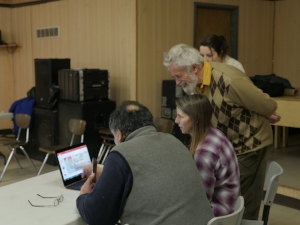What changes have Elders already seen in climate, wildlife, and the landscape during their lifetime?
Discussions with community members and leaders, and learning from the experiences shared by others, are helping communities find ways of preparing for the changes that are coming. Combining the knowledge of Elders and the insights of science paints the picture of the ways changes in climate are likely to affect northern First Nations in the future. At the same time as identifying concerns, preparing for any benefits of a warmer climate in northern Ontario is also important.
Traditional Ecological Knowledge (TEK)
Refers to knowledge that has been collected in the minds of individuals through their personal observations of the environment and by story-telling from generation to generation. TEK is extremely valuable for learning about changes that happen in the environment over a lifetime, especially because of slowly changing weather. Climate is changing around the world, but the impacts are different for each community. TEK is local knowledge that shows those differences.
In remote northern regions, measurements of changes in weather over the years do not date back as far as the memories of people living in communities. Weather stations are often spaced out hundreds of kilometers across the landscape and do not capture the local details.
Simply put, the people that use and travel the land every day are the first to observe changes. Their observations show the reality on the land not recorded by weather stations. They can also lead to investigation of environmental questions important to their community. The most powerful stories about how weather is changing and the risks this might bring to communities over generations in the future come from combining local knowledge with knowledge from science.
Summarizing the community impacts, outlining the potential risks, and discussing adaptation options is the purpose of this project.
Training Community Climate Change Specialists to Interview
The model we have adopted involves employing a part-time First Nation Climate Change Leader in each Tribal Council and a part time Climate Change Specialist in each First Nation community. Climate Change Specialists in the communities conduct interviews with Elders and harvesters about their observations and knowledge of changes occurring on the land and in weather patterns, and the impacts of those changes on their traditions, lifestyle and community. A standard list of interview questions is provided as a guide. Examples include:
Have there been any changes in plants or trees, such as dead or dying trees, kinds that have disappeared, or new ones you have found?
What changes have you noticed in lakes, rivers and creeks?
Has fishing changed?
Has there been a change in the amount of winter rain? Any changes in the snow pack?
Summarizing important community observations
Once the TEK has been collected from the community, common themes, concerns, and impacts are identified. These points are then used to guide the identification of the climate change vulnerabilities of the community.
Once vulnerabilities are identified, their risks can be assessed and potential adaptation strategies can be discussed.
Sharing the findings and developing action plans
Identified vulnerabilities, the assessment of their risk, and potential adaptation strategies should be reviewed with the community. This way, the list of possible impacts can be refined and confirmed and the priorities for dealing with those impacts can be chosen.
The final step is to develop action plans for these priorities. Some actions will be simple and communities can take immediate action. Others may be expensive and require collaboration, planning, and further assessment.
Explore our resources for TEK collection in your community
Assess Prioritize Prepare
Questionnaire for interviewing Elders and community members
The questionnaire is a set of interview questions for learning about climate change impacts and observations in northern communities. Use as is or as inspiration to create your own; the word document is available by request. The result of the interviews can feed into your Adaptation Framework.
The Access, Prioritize, Prepare (APP) document is a ‘rapid risk assessment’ tool for gathering climate change observations, risks, and impacts. It includes questions to stimulate discussion and a planning table to help link climate change observations to adaptation actions. This APP can fit well into the Adaptation Framework.
Fill-It-In Climate Change Impacts Worksheet









